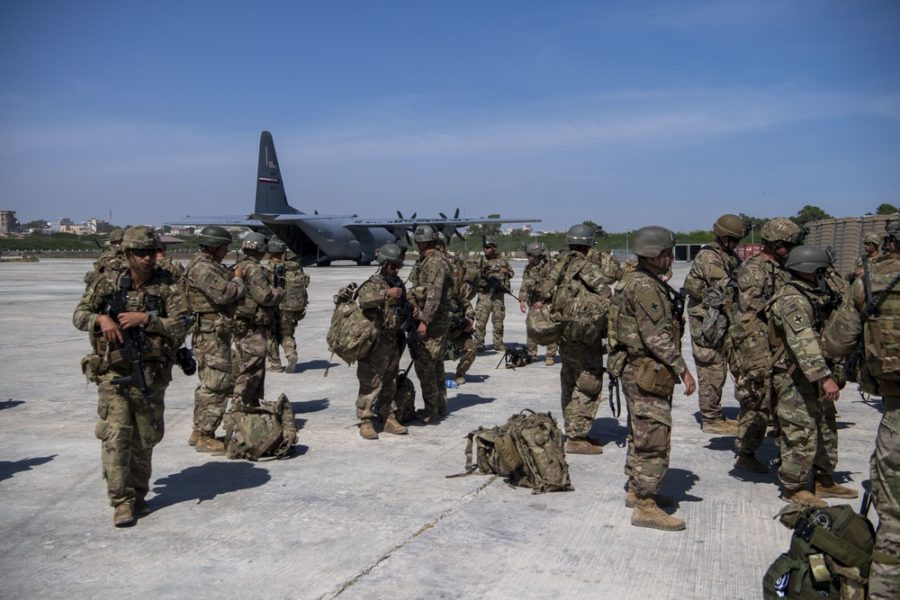It’s been more than 15 months since then-President Donald Trump ordered the Pentagon to withdraw the majority of its troops from Somalia. Since then, service members have had to “commute to work,” flying in from places such as Kenya and Djibouti to help train Somali forces and conduct operations against al-Shabab, the terrorist group that is part of al-Qaeda.
That setup, the head of U.S. Africa Command told lawmakers March 15, isn’t working.
“Our periodic engagement, also referred to as commuting to work, has caused new challenges and risks for our troops,” Army Gen. Stephen J. Townsend told the Senate Armed Services Committee. “My assessment is that it is not effective; it’s not efficient; and it puts our troops at greater risk.”
Townsend has expressed dissatisfaction with the situation before. In April 2021, he told the SASC that “our understanding of what is happening in Somalia is less now than when we were there on the ground physically located with our partners.” But Townsend also said at the time that “we’re working to make this new mode of operation work.”
In his written testimony this year, Townsend warned that “Somalia’s slow but continued steps towards stability stalled over the past year.”
At the same time, Townsend also called al-Shabab al-Qaeda’s “largest and wealthiest global affiliate” and Africa’s greatest threat to U.S. people and interests in the region and to the U.S. homeland.
With a reduced presence—less than 100 troops are still on the ground—the counterterrorism mission to combat al-Shabab has struggled, Townsend said.
“We are marching in place at best. We may be backsliding,” Townsend said. “I just think that what we’re doing is not providing sufficient pressure, and the best we can do is maintain a secure area around the bases that we return to when we really can’t get at the al-Shabab problems.”
Asked by Sen. Jim Inhofe (R-Okla.) whether he had asked his chain of command to restore the U.S. presence in Somalia to combat al-Shabab, Townsend declined to say but offered a hint.
“Respectfully, Senator, I have submitted advice to my chain of command, and my chain of command is still considering that advice,” Townsend said. “And I’d like to give them space to make that decision.”
Townsend has led AFRICOM for more than two-and-a-half years now, and Sen. Jack Reed (D-R.I.) noted in his opening statement that he will likely leave the post in the coming months—no AFRICOM commander has served for more than three-and-a-half years.
While al-Shabab represents a growing threat inside the continent, Russian mercenaries are an outside factor that continue to concern Townsend and lawmakers.
So-called private military companies such as the Wagner Group are “a malign influence,” Townsend said. “They don’t follow anybody’s rules. They do what they want. They buttress dictators. They do gross violations of human rights. I think it’s bad for Africa’s security and prosperity in the future.”
Alarm over the use of such groups in the region has exploded in recent months—officials commonly believe they are connected to the Kremlin and are used strategically to leverage Russia’s larger interests in Africa.
Noting these assessments, Townsend said members of the Wagner Group “essentially run the Central African Republic” and have recently arrived in Mali in West Africa. They also are deployed in Libya and Sudan, where they extract natural resources and disrupt partnerships.
Their presence presents a number of challenges to American efforts in Africa, Townsend added.
“First, for example, overflight permissions—so with a continent as vast as Africa, we absolutely depend on air movement for everything,” Townsend said. “And when we see Wagner move in, they impose overflight restrictions, either through the government withdrawing permissions for overflight, or in the case of Libya, Wagner importing sophisticated advanced surface-to-air missile systems to protect their activities there but also deny the airspace.
“… Secondly, usurping partnerships. So as we’ve seen happen just now in Mali. The Malian government has asked the French forces to depart and instead have invited in this Russian [private military company]. And I think that is disturbing. It’s impacting our partnership with that same government as well. And I think that’s not good for Mali’s future.”
When asked what AFRICOM is doing to counter the influence of these mercenary groups, Townsend said his command has conducted information operations, “shining a spotlight” on their actions, while also counseling allies and partners not to allow such groups within their borders.
Ultimately, however, Townsend expressed optimism that such groups would be less impactful in the long run.
“An example … is in Libya, where they have worn out their welcome there. And the Libyans, even the Libyans who the Russians supported in the Civil War, now want them to depart,” Townsend said. “So, actually, I think that they’re probably their own worst enemy.”
